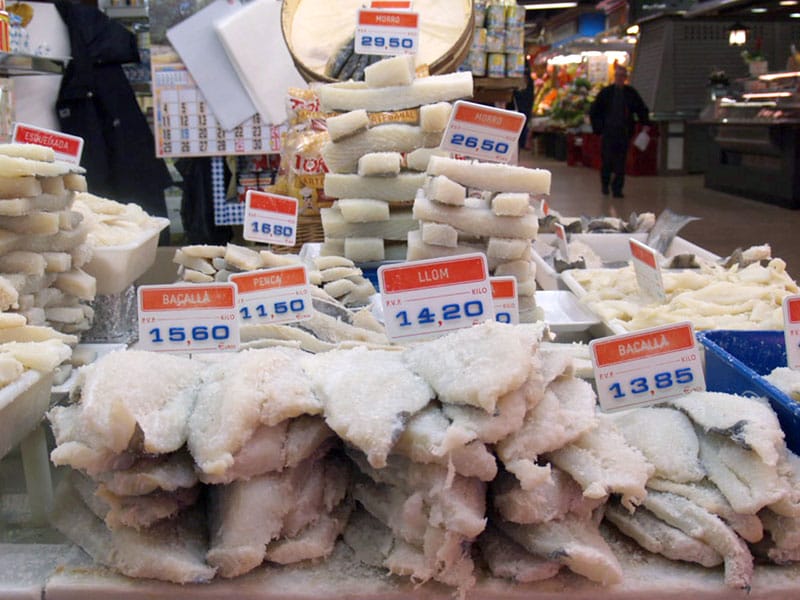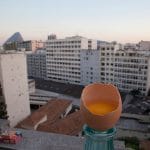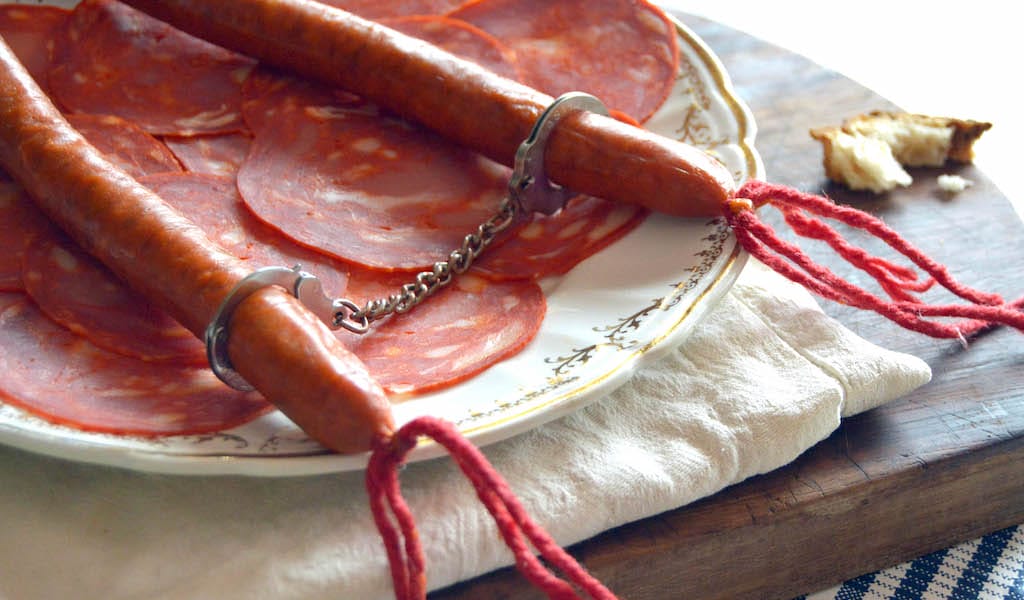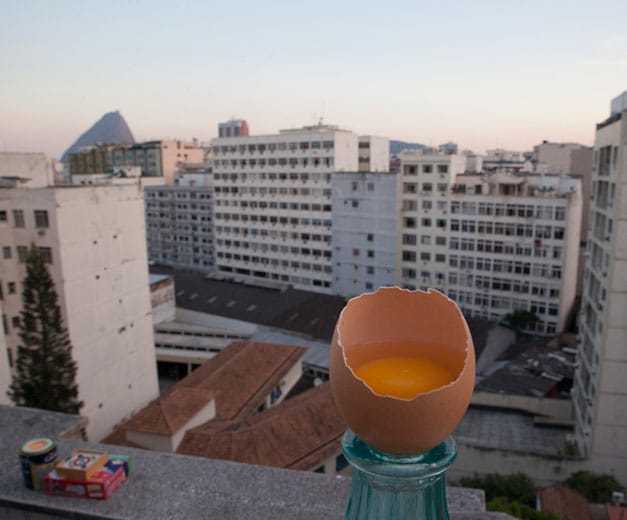You are what you eat, as the saying goes. Is it any surprise, then, that food figures so largely in popular culture all over the world? In Spain, we have a veritable cornucopia of food-related expressions. Here’s a taste:
Dar una torta, “to give a cake.” To slap someone. But darse una torta, “give a cake to yourself,” means you hit something else. It’s a mild, lighthearted expression, even with tortazo, which is a bigger biff, and comes from the funny old circus setup where a clown throws a cake into the face of another clown.
Dar una galleta, “to give a cookie.” To slap someone.
Related: menuda galleta, “little cookie.” Kids and teenagers like to use this funny- sounding phrase to describe a skate, bike, car or other conveyance smashing into a wall, tree, etc. Dar una piña/leche “to give a pineapple/milk,” works the same way.
Example: “What a menuda galleta I had with the skateboard, bro!”
Estar de/Tener mala leche, “have bad milk.” To be sharp, in a bad mood, have bad intentions or be angry and as unpleasant as sour milk. Also used the same way with mala uva, “bad grape.”
Example: “The company is firing everybody without pay – what a mala leche they have! And what a mala leche I have now! I would like to repartir leches [slap] all the idiots on the company board!”

Ir a toda leche, “to go full milk.” To go really fast – pedal to the metal!
¿Qué leches…? “What milks … ?!” WTF…?!
Example: Qué leches are you saying?!
¡La leche! “The milk!” OMG!
La leche de, “the milk of.” A lot of something, as in the confusing phrase esta receta tiene la leche de ingredientes, “this recipe has a lot of ingredients” (and milk is not one of them).
¡Esto es la leche! “This is the milk!” This is awesome! Alternatively, it can be used to describe something as being really intense or strong.
Example: “The storm last night was la leche.”
¡Eres la leche! “Man, you’re the milk!” A wide-ranging expression – depending on the context, it could mean you’re the best, the worst, a bastard, stupid, wonderful, unbelievable, ingenious, hilarious, an asshole, a prince.
De uvas a peras, “from grapes to pears.” Occurring infrequently or rarely, for grapes are harvested in fall and pears in late summer, with the whole year in between.
Example: “It’s such a shame – we see each other de uvas a peras! From now on, I’m going to visit you every day… twice a day!”
De higos a brevas, “from late figs to early figs,” is used the same way.
¡No caerá esa breva! “This early fig will not drop!” No such luck! Brevas (early figs) are the most delicious, so you’re lucky if one drops from the tree for you.
Example: “Get a table at Tickets [insanely hot restaurant owned by the Adrià brothers] without booking three months in advance? Ha ha, no caerá esa breva!”
Al pan, pan y al vino, vino, “to the wine, wine and the bread, bread.” Tell it like it is.
Más largo que un día sin pan, “longer than a day without bread.” Very long.
Examples: “The way back home was más largo que un día sin pan”; “Your nose is más largo que un día sin pan.”
Esto es pan comido, “this is eaten bread.” This is a cakewalk; it’s a snap.
Estoy más tieso que la mojama, “I’m stiffer than a mojama [rock-hard salt-cured tuna].” Similar: Estoy más seco que un bacalao, “I’m dryer than salt cod.” I’m flat broke.
Example: “Hey baby, I can’t go to dinner at Tickets. I’m unemployed and más seco que un bacalao.”
Alternatively, if the verb ser is used instead of estar, it means to have no flair, grace, good mood or sense of humor.
Example: “Eres más seco que un bacalao. Come on, smile! We got into Tickets, thanks to my father’s money!”
Ser quien corta el bacalao, “to be the one who cuts the cod.” To be the boss, the one running the show. This expression probably originated from the 16th century, when the foreman was in charge of cutting the salt cod and dividing it among workers (often slaves).
Example: “But sweetheart, I know that your father es quien corta el bacalao in all the Mediterranean by drug smuggling, but I don’t want his dirty money to eat at Tickets!”

Estar como un queso, “to be like a cheese.” Estar para mojar pan, “to be for dipping bread.” Estar jamón, “to be ham.” Es un bombón, “He/she is a chocolate.” All of these are used to describe someone who is desirable or hot.
Example: “La leche! Your cousin Manuel está como un queso, your brother Antonio está para mojar pan, your music teacher Jordi está jamón and your neighbor from next door es un bombón! Please let me be your roommate!”
¡Serás chorizo! “You chorizo!” Thief! The idiomatic meaning comes from the word chori, “thief” in Caló, the Iberian Romani language. The Spanish took the word and transformed it to sound like the name for the red-hued, spiced pork sausage. (For you language nerds out there, the use of the future tense in this case connotes incredulity and surprise, offering a more concise way of saying “What a chorizo!” and “How can you be such a chorizo?”)
No hay pan para tanto chorizo, “there isn’t enough bread for all this chorizo.” During the public demonstrations in Spain in May 2011, this was the phrase most shouted by the thousands of indignados and became well known from that point on. It’s a play on words and denounces the rampant corruption in Spain as one of the causes of the economic crisis, calling out all the thieving politicians – that is, chorizos – who stole from public funds over the years. The phrase also refers to the Spanish custom of serving a quantity of chorizo with a sufficient amount of bread to eat it with (we make a lot of chorizo sandwiches). So for the indignados, the refrain means “too many thieves,” “we don’t have bread or money” and “because there are so many thieves, we need more money.”
Esto es una patata/un churro, “this is a potato/churro.” A botched or shoddy job.
Related: Pasar la patata caliente, “to pass the hot potato.” Pass the buck, the problem, the mess.
Example: “My boss passed me the patata caliente when I had to give a public apology on behalf of the company, and he was the one responsible for the factory churro. What a mala leche!”
Estar a la sopa boba, “be with the silly soup.” In the 16th century, sopa boba was a cheap, simple soup made by adding water to the leftovers that convents and institutions would give to the poor. Over time, the expression has come to mean someone who lives like a parasite or is a layabout.
¡Vete a freír a espárragos! “Go fry asparagus!” Go to Hell, piss off.
Me importa un pimiento/rábano, “this matters as much to me as a pepper/radish.” I couldn’t care less.
No todo el monte es oregano, “not all the hill is oregano.” They can’t all be winners. You can’t expect everything to be wonderful.
Se te pasa el arroz, “your rice is getting overcooked.” Your best days are behind you; your opportunities are slipping away. A very common expression, traditionally used for a woman who is becoming too old to get pregnant, to find love or to get married.
 April 29, 2014 Chinese Food Idioms
April 29, 2014 Chinese Food Idioms
In a country where the traditional way to greet someone translates to “Have you eaten […] Posted in Shanghai April 3, 2014 Greek Food Idioms
April 3, 2014 Greek Food Idioms
With its rich, profound history – its roots lie in epics and at the foundation of modern […] Posted in Athens February 14, 2014 Rio’s Food Idioms
February 14, 2014 Rio’s Food Idioms
You are what you eat, as the saying goes. Is it any surprise then that food figures so […] Posted in Rio
Published on April 23, 2014
Related stories
April 29, 2014
ShanghaiIn a country where the traditional way to greet someone translates to “Have you eaten yet?” (你吃了吗? Nǐ chīle ma?), it should come as no surprise that food idioms permeate everyday language in China. Chinese culture also prizes indirectness, so idioms are the perfect way to portray deep meaning without being overt. Frustrating for cross-cultural…
April 3, 2014
AthensWith its rich, profound history – its roots lie in epics and at the foundation of modern civilization, after all – the Greek language is ripe for and with metaphor, particularly of the food-related variety. Folk sayings and proverbs have a prominent place in colloquial language and everyday life, and they are at turns humorous,…
February 14, 2014
RioYou are what you eat, as the saying goes. Is it any surprise then that food figures so largely in popular culture all over the world? In Rio, food and culture go hand in hand like Romeu and Julieta (for Brazilians, that refers to white cheese and guava paste, respectively, which are such a tasty combination…


















































































